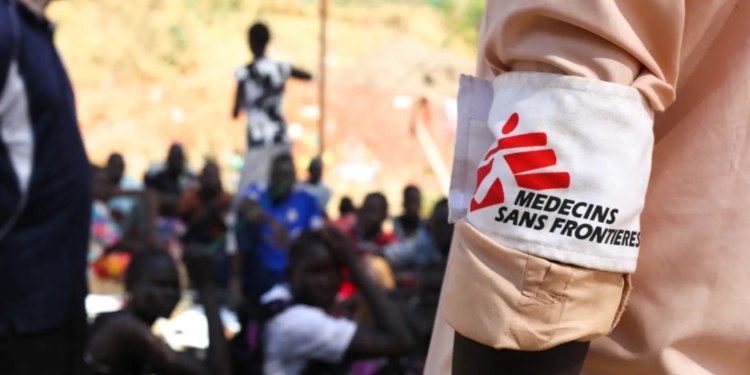- MSF called for urgent reinforcement of routine immunization campaigns to address the situation
A non-governmental humanitarian medical care organization, Médecins Sans Frontières (Doctors Without Borders), has expressed concern over the surge in measles admissions at its facility in Maiduguri, Borno State.
In a statement released on Friday, signed by MSF’s Field Communications Manager, Georg Gassauer, and Field Communications Coordinator, Alex Marcou, the organization highlighted that despite treating approximately 9,618 patients, primarily children under five, for measles in various communities in 2023, the number of cases continued to rise as of February 9.
MSF called for urgent reinforcement of routine immunization campaigns to address the situation.
Measles, a highly contagious disease with severe consequences, remains a significant threat, causing tens of thousands of child deaths annually, as emphasized by the United Nations Children’s Fund (UNICEF). UNICEF pointed out that measles can lead to lifelong disabilities, including blindness, deafness, and permanent brain injury, highlighting Nigeria’s ranking among the top five countries for reported measles cases.
In the first quarter of 2022, Nigeria experienced the highest global measles cases. However, in the first quarter of 2023, there was a notable reduction, with 2,651 cases recorded across 29 states, reflecting an 86% decrease from Q1 2022, according to the organization’s data.
MSF’s statement read, “In 2023, MSF teams treated a total of 9,618 patients with measles in both of its healthcare facilities, Gwange Paediatric Hospital and Nilefa Kiji nutrition hospital, and in MSF-supported primary healthcare centres in Maiduguri.
“We did not expect such a large influx of patients, particularly at the end of the year, as explained by MSF’s medical coordinator Abdulwahab Mohamed, referring to the 3,965 patients treated from October to December, which represent almost three times more than for the same period in 2022.
“MSF Medical Activity Manager at Gwange Paediatric Hospital, Dr Jombo Tochukwu-Okoli, attributes this alarming rise in the number of cases to an inability of public health actors to achieve the 95 per cent vaccination rate, required to suppress the outbreak.
“This is notably due to the difficulties for the health workers in accessing rural communities surrounding Maiduguri, as the insecurity has made vaccination campaigns a difficult endeavour.”
MSF further noted that the interruption of routine childhood vaccination during the COVID-19 pandemic disrupted the health systems, consequently affecting the implementation of routine immunisation campaigns.
It further pointed out that technical complications also contributed to the interruptions in the cold chain, which made the vaccine defective.
“The measles spike coincides with an unprecedented diphtheria outbreak in Northern Nigeria and a longer-than-usual malaria season. The diphtheria outbreak, with 24,500 suspected cases and more than 600 deaths reported since it was officially declared in January 2023, is yet another strong indicator of the dramatic setback in routine immunisation programs and the lack of long-term efforts to increase vaccination coverage in the country,” UNICEF added.
It further quoted Tochukwu-Okoli as saying, “Measles is one of the most contagious viral diseases in the world. Infecting the immune cells, the virus quickly spreads all over the body and eventually affects the respiratory system. This causes a cough that can spread the virus to others.
“One infected child can spread the virus to between nine and 12 other unvaccinated children. Although there is currently no specific cure to treat measles, there are life-saving drugs that can keep patients stable and prevent complications.
“As the virus affects the immune system it can lead to serious complications long after measles is gone. This makes the virus so deadly as it leaves a child open to other, specifically diarrhoeal, diseases.”
The physician noted that measles was notorious for triggering malnutrition, because of the degenerative impact the virus has on the gastrointestinal lining.
He noted that the diarrhoea symptom also makes it difficult for a child to retain and absorb nutrients in the post-measles phase, thus, depriving the child of essential micronutrients and depressing a child’s immunity.
“In the Northeast of Nigeria, where access to nutritious food is seasonally limited, diseases like measles, among other factors, lead to higher levels of malnutrition and create a vicious cycle, as the malnourished status also leads to further immune suppression. In turn, this generates greater morbidity and mortality linked to measles and other diseases.
“The complex security situation in Northern Nigeria, significant funding cuts by international donors for Nigeria, and the continuous neglect of public health infrastructure is alarming. Considering the high prevalence of vaccine-preventable outbreaks, such as measles, diphtheria and meningitis, MSF is cautioning international and national stakeholders not to look away at what could be an oncoming perfect storm for a worsening of the humanitarian crisis in 2024,” Tochukwu-Okoli added.










Discussion about this post